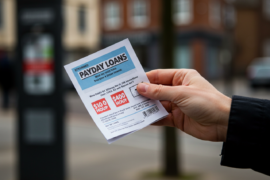This article may contain references to products or services from one or more of our advertisers or partners. We may receive compensation when you click on links to those products or services. Nonetheless, our opinions are our own.
- Key Highlights
- Understanding the Basics of Gap Insurance and What It Covers
- Why You Might Need Gap Insurance for Your Vehicle
- Alternatives to Gap Insurance
- How to Determine the Right Amount of Gap Coverage
- Navigating the Claims Process
- Common Misconceptions About Gap Insurance
-
Frequently Asked Questions
- What is gap insurance?
- Who should consider gap insurance?
- How does gap insurance work in a claim?
- What documents are required for a gap insurance claim?
- Is gap insurance required by law?
- How much does gap insurance cost?
- Can I buy gap insurance after purchasing a car?
- How long should I keep gap insurance?
- Can I cancel my gap insurance policy?
- Recommended Reads
Key Highlights
- Understand what gap insurance is and how it protects your finances
- Learn when gap insurance is necessary and who benefits most
- Explore how to choose the right amount of gap coverage
- Get insights into the claims process and common misconceptions
- Compare different gap insurance providers to find the best option
Understanding the Basics of Gap Insurance and What It Covers
Gap insurance serves as a financial safety net when the value of your vehicle falls short of the amount you owe on your loan or lease. This situation arises because of depreciation, which significantly reduces the value of a car once it leaves the dealership. If your vehicle is totaled or stolen, standard auto insurance typically covers only the car’s actual cash value at the time of the loss, leaving you responsible for any remaining loan balance. Gap insurance helps bridge this difference, ensuring you are not left paying for a car you no longer own.
What Gap Insurance Covers
- The difference between your auto loan balance and the car’s market value
- Certain rental car expenses if included in your policy
- Deductibles in some cases, depending on the insurer
| Coverage Type | Description |
|---|---|
| Loan Balance Gap | Covers the shortfall between your car’s value and loan amount |
| Rental Car Reimbursement | Helps with temporary transportation costs |
| Deductible Payment | May cover your deductible in case of a total loss |
Why You Might Need Gap Insurance for Your Vehicle
Gap insurance is especially beneficial if your vehicle depreciates faster than you can pay off your loan. This coverage can prevent financial strain if your car is totaled and your insurance payout does not cover your outstanding balance.
When Gap Insurance Is Beneficial
- New or recently purchased vehicles: New cars can lose up to 20% of their value in the first year alone.
- High loan-to-value ratios: If you financed most of your car purchase, you might owe more than the car’s worth.
- Leased vehicles: Many lease agreements require gap insurance to protect against financial loss.
| Scenario | Vehicle Value | Amount Owed | Gap Insurance Needed |
|---|---|---|---|
| Car Totaled | $20,000 | $25,000 | $5,000 |
| Car Stolen | $15,000 | $18,000 | $3,000 |
By understanding these scenarios, you can determine if gap insurance aligns with your financial goals and whether it provides the protection you need.
Alternatives to Gap Insurance
- Increasing your down payment to reduce the loan amount
- Choosing a shorter loan term to match vehicle depreciation
- Buying a vehicle with a higher resale value
- Ensuring your auto insurance policy includes new car replacement coverage
These alternatives can help mitigate the financial risks associated with depreciation and potential gaps in coverage without needing specific gap insurance.
New Car Replacement Coverage
New Car Replacement Coverage is an alternative to Gap Insurance that can provide similar protection. This coverage ensures that if your new car is totaled, stolen, or damaged beyond repair within a certain time frame (usually the first few years), you will receive a brand new car of the same make and model.
Better Car Replacement Coverage
Better Car Replacement Coverage is an enhanced version of traditional new car replacement coverage. It offers the option to upgrade to a better vehicle, ensuring you can replace your lost car with a newer or more expensive model.
How to Determine the Right Amount of Gap Coverage
Factors to Consider
- Vehicle depreciation rate: Some vehicles lose value faster than others.
- Loan terms: A high-interest loan or long repayment period may increase the risk of negative equity.
- Driving habits: If you frequently drive long distances, your car may depreciate more quickly.
- Overall financial situation: If a total loss would significantly impact your finances, additional coverage may provide peace of mind.
| Scenario | Suggested Gap Coverage |
|---|---|
| New Car and High Loan | $5,000 – $10,000 |
| Older Car with Moderate Loan | $2,000 – $5,000 |
| Low Loan Balance on High-Value Car | $1,000 |
Steps to File a Gap Insurance Claim
- Contact your insurer: Report the accident or theft and provide the necessary details.
- Gather documentation: This includes your auto loan balance, vehicle purchase agreement, and police report (if applicable).
- Review your settlement: Your primary auto insurer will issue a payment based on the car’s market value at the time of loss.
- Submit your claim to gap insurance. If your insurance payout is less than you owe, gap coverage will pay the difference.
| Your Vehicle’s Value | Loan Balance | Gap Insurance Payout |
|---|---|---|
| $15,000 | $20,000 | $5,000 |
| $12,000 | $16,000 | $4,000 |
Common Misconceptions About Gap Insurance
Myths About Gap Insurance
- Gap insurance covers everything: It only pays the difference between your car’s value and your loan balance, not repairs, medical bills, or rental costs.
- It’s only for new cars. While new cars depreciate quickly, used cars with high loan balances may also benefit from gap insurance.
- Standard auto insurance is enough. Traditional coverage only pays for the vehicle’s market value, which can be significantly less than what you owe on a loan or lease.
Frequently Asked Questions
What is gap insurance?
Gap insurance covers the difference between your auto loan balance and the actual cash value of your car if it is totaled or stolen.
Who should consider gap insurance?
Gap insurance benefits those who made a small down payment, lease a vehicle, or own a car that depreciates quickly.
How does gap insurance work in a claim?
If your car is declared a total loss, your primary insurer pays its market value. If that amount is lower than your loan balance, gap insurance covers the remaining amount.
What documents are required for a gap insurance claim?
You typically need an insurance claim settlement, a loan payoff statement, and the vehicle purchase agreement.
Is gap insurance required by law?
No, but some lease agreements mandate gap coverage.
How much does gap insurance cost?
Prices vary based on the provider, vehicle, and policy type, typically ranging from a few hundred to a few thousand dollars.
Can I buy gap insurance after purchasing a car?
Yes, many providers allow you to add gap insurance after purchasing a vehicle, though early coverage is advisable.
How long should I keep gap insurance?
Keep it until your car’s market value is equal to or greater than your loan or lease balance.
Can I cancel my gap insurance policy?
Yes, most providers allow you to cancel gap insurance at any time, sometimes with a refund for unused coverage.
By understanding how gap insurance works and when it’s necessary, you can make a well-informed decision to protect your financial well-being.

Reviewed and edited by Albert Fang.
See a typo or want to suggest an edit/revision to the content? Use the comment form below for feedback.
At FangWallet, we value editorial integrity and open collaboration in curating quality content for readers to enjoy. Much appreciated for the assist.
Did you like our article and find it insightful? We encourage sharing the article link with family and friends to benefit as well - better yet, sharing on social media. Thank you for the support! 🍉
Article Title: How Gap Insurance Works: Who Needs It & How to Get It
https://fangwallet.com/2025/02/26/how-gap-insurance-works/The FangWallet Promise
FangWallet is an editorially independent resource - founded on breaking down challenging financial concepts for anyone to understand since 2014. While we adhere to editorial integrity, note that this post may contain references to products from our partners.
The FangWallet promise is always to have your best interest in mind and be transparent and honest about the financial picture.
Become an Insider
Editorial Disclaimer: The editorial content on this page is not provided by any of the companies mentioned. The opinions expressed here are the author's alone.
The content of this website is for informational purposes only and does not represent investment advice, or an offer or solicitation to buy or sell any security, investment, or product. Investors are encouraged to do their own due diligence, and, if necessary, consult professional advising before making any investment decisions. Investing involves a high degree of risk, and financial losses may occur including the potential loss of principal.
Source Citation References:
+ Inspo












































